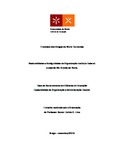Racionalidades e ambiguidades da organização Instituto Federal: o caso do Rio Grande do Norte.

Visualizar/
Data
2016-02-29Autor
Fernandes, Francisco das Chagas de Mariz
Fernandes, Francisco C. M.
http://lattes.cnpq.br/7484296235287164
Metadado
Mostrar registro completoResumo
This thesis approaches and enhances the understanding of the dynamics of the administration of the Federal Institute of Rio Grande do Norte (IFRN) as part of the Brazilian education system, in the light of the theory of organizations, resorting to the theoretical option of the “diptych operating mode” of the school as an organization, to analyze the strong and weak joints in a context of coexistence between models of bureaucracy and organized anarchy. The study aimed at deepening the understanding of the dynamics of bureaucratic and/or anarchical nature, of the management of a vocational education institution, with multiple campuses, operating at the levels of basic and higher education, and its impact on decentralization processes, power and management autonomy. The federal institutes constitute a new approach, whose social function is to ensure the provision of effective and quality public education, with new management and administrative organizational procedures. They were created by Federal Law No. 11.892, on December 29, 2008, in the context of the vocational education expansion project, implemented in the three (3) first mandates of the Workers' Party government, between the years 2003 and 2014. The study assumed the prospects of a qualitative nature research through the case study method, taking the IFRN as empirical field. For the procedures of collecting and analyzing data, observations, document analysis, semi-structured interviews with 21 (twenty-one) directors, and content analysis, were used respectively. The study results show that there is no clarity by the Federal Institute of Rio Grande do Norte community, in the matters of identity nature, such as: goals, objectives and social function of the educational organization, pursuant the asumptions of its creation. The data also show that the multiple campuses configuration of shared administrative autonomy between the rectory and the campuses, a “relative coexistence of power” between the Rector and the campuses General-Directors, gives the Federal Institute a reality of an organization made up of organizations, with operating typology consistent with the concepts of a “loosely coupled system”. On the other hand, the educational offerings at various levels of national education, in the multiple campuses, is a purpose that can jeopardize the quality of the academic work in the organization. Finally, the data show that educational, research and extension activities of each campus must be defined in line with the specificities of their social operation environment.



